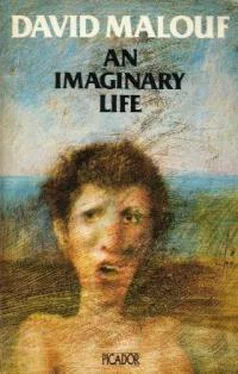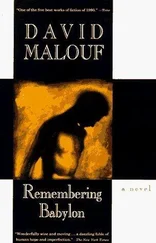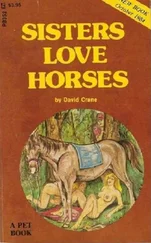WHEN I first saw the child I cannot say. I see myself - I might be three or four years old - playing under the olives at the edge of our farm, just within call of the goatherd, and I am talking to the child, whether for the first time or not I cannot tell at this distance. The goatherd is dozing against an olive bole, his head rolled back to show the dark line of his jaw and the sinews of his scraggy neck, the black mouth gaping. Bees shift among the herbs. The air glitters. It must be late summer. There are windblown poppies in the grass. A black he-goat is up on his hind legs reaching for vine shoots.
The child is there. I am three or four years old. It is late summer. It is spring. I am six. I am eight. The child is always the same age. We speak to one another, but in a tongue of our own devising. My brother, who is a year older, does not see him, even when he moves close between us.
He is a wild boy.
I have heard the goatherds speak of a wild boy, whether this one or another I do not know; and of course I do not admit to them, or to anyone, that I know him. The wild boy they speak of lives among wolves, in the ravines to the east, beyond the cultivated farms and villas of our well-watered valley. There really are wolves out there. I have heard stories of how they raid the outlying pastures, and once I think I heard one howling in the snow. Unless it was the child. And I have seen a wolf’s head that one of the hunters brought back to hang up as a warning in his fold. It was gray, and not very fierce looking, despite the curling back of the flesh over its fanged jaw.
I thought of the child, and how wolves must have something in their nature which is kindly, and which connects with our kind, or how else could the child live amongst them? What was frightening was the way the head had been hacked off, with ropes of dark blood hanging from it and the fur at its throat matted with blood. Later I heard, again from the goatherds perhaps, that there is indeed some part of our nature that we share with wolves, and something of their nature that is in us, since there are men, at certain phases of the moon, who can transform themselves into wolves. They close their human mind like a fist and when they open it again it is a wolf’s paw. The skull bulges, the jaw pushes out to become a snout. Hair prickles down their spine, grows rough on their belly. The body slouches and is on all fours. The voice thickens. It is the moon that draws them on. I believed such things in those days, and wondered. Was the child a wolf boy? Were those wolf men who lived secretly among us, changing themselves painfully at the moon’s bidding, children who had been captured from the wilds and brought in among us, to be adapted to the ways of men? Sometime when my own body began to change and I discovered the first signs of manhood upon me, the child left and did not reappear, though I dreamt of him often enough in those early years, and have done so since. I have forgotten the language we used, and if he were to reappear, perhaps we could no longer communicate. Did he have some message for me then? If so, he failed to deliver it. Or did so and it has slipped my mind. Or the language he used on whatever occasion it was had already passed my understanding and could not be translated into daily speech. I believe (I think I have always believed) that he will come again. But in what guise? As a child still? As a man of my own age? As a wolf? Or has he the power to adopt other forms as well? Has he already returned to me, perhaps, in a form so humble, so ordinary, that I failed to perceive his presence?
I tell no one of this, as all those years ago I was careful to admit to no one that he was there - not even my brother who was the same age and would have understood. Under all my skepticism this grain of belief.
IT is the desolateness of this place that day after day fills my mind with its perspectives. A line of cliffs, oblique against the sky, and the sea leaden beyond. To the west and south, mountains, heaped under cloud. To the north, beyond the marshy river mouth, empty grasslands, rolling level to the pole. For eight months of the year the world freezes. Some polar curse is breathed upon the land. It whitens overnight. Then when the ice loosens at last, and breaks up, the whole plain turns muddy and stinks, the insects swarm and plague us, hot mists steam amongst the tussocks. I have found no tree here that rises amongst the low, grayish brown scrub. No flower. No fruit. We are at the ends of the earth. Even the higher orders of the vegetable kingdom have not yet arrived among us. We are centuries from the notion of an orchard or a garden made simply to please. The country lies open on every side, walled in to the west and south, level to the north and to the northeast, with a view to infinity. The sharp incline of the cliffs leads to sky. The river flats, the wormwood scrubs, the grasslands beyond, all lead to a sky that hangs close above us, heavy with snow, or is empty as far as the eye can see or the mind imagine, cloudless, without wings.
Bur I am describing a state of mind, no place.
I am in exile here.
The village called Tomis consists of a hundred huts made of woven branches and mud, with roofs of thatch and floors of beaten mud vovered with rushes. Each hut has a walled yard, and a byre where the animals can be brought in and stalled for the winter. Above the byre, in one large room, we sleep and eat in the winter, on wooden benches above a layer of slow-burning peat. In summer, the rest of the house is opened up and I have a room of my own, with a low table for writing and a palliase of clean straw.
My life here has been stripped to the simplest terms. I live with the headman of the village, who has been set to watch over me, and maybe, when the time comes, to finish me off. The household consists of the headman, his mother (an old woman of nearly eighty) and his daughter-in-law and her child. They are rough, kindly people, and the old man, for all that he is a barbarian, treats me with some regard for my former position. If anything, I am ignored, left to my own devices, to wander about the village or as far as it is safe to go into the fields. They have no need to fear my escape. In all the known world, where the emperor rules, I have no official existence. And beyond this last outpost is the unknown. Even supposing I had the energy for it in my present condition, where could I go? I move around the muddly little fort, or I make excursions into the scrub, though never beyond sight of the walls, since at any season the village may be attacked by the savages who inhabit the open grasslands to the north and who periodically come howling in packs to steal our animals or fire the outlying fields. The whole village is an armed camp. And I am the least person here - a crazy, comic old man, grotesque, tearful, who understands nothing, and whose ways, so it must seem to these dour people, are absurdly out of keeping with the facts of our daily existence. The feed me. They provide a corner where I can sleep. They are not uncivil. But no one in Tomis speaks my tongue, and for nearly a year now I have heard no word of my own language; I am rendered dumb. I communicate like a child with grunts and signs, I point, I raise my eyebrows, questioning, I burst into tears of joy if someone - a child even - understands what I am trying to say. In the open I go about shouting, talking to myself simply to keep the words in my head, or to drive them out of it. My days in this place, my nights, are terrible beyond description. All day I wander in a dream, as isolated from the world of men as if I belonged to another species. At night I discover in sleep what the simple daylight blinds me to: that the dark side of every object here, and even more, the landscape itself when night shadows flow over it, is a vast page whose tongue I am unable to decipher, whose message to me I am unable to interpret. In dream after dream I venture out beyond the stubbled fields into the desolate plain beyond, into the grasslands beyond the edge of our world. The wind rolls over them. They heave like the sea, hissing, sighing, and the air is filled with the wings of cabbage moths. I fall to my knees and begin digging with my long nails in the earth. Sometimes wolves come, and they claw at the earth beside me. Howling. We dig together, and they pay no more attention to me than they would to a ghost. But I know that whatever it is they are scratching after, I must discover before them, or I am lost. So I dig harder, faster, sweating, with the moonlight greasy upon me.
Читать дальше












